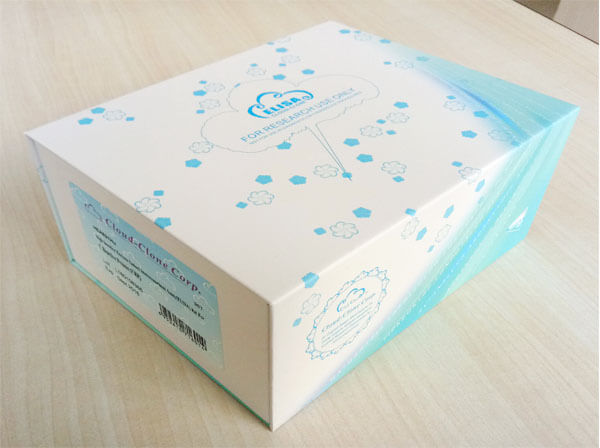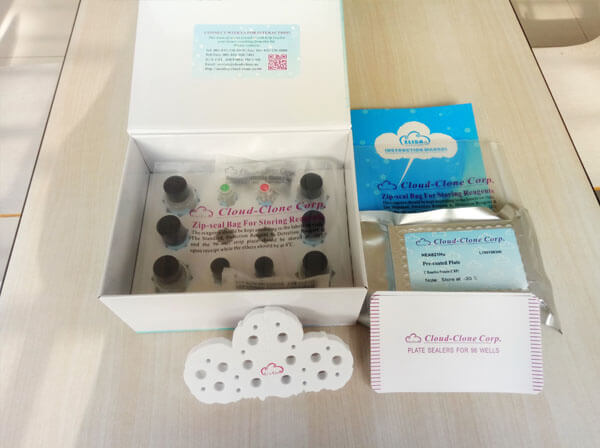ELISA Kit for Anti-Cubilin Antibody (Anti-CUBN)
Katalog-Nummer USCN-AEC411Hu-96
Size : 96T
Marke : USCN
ELISA Kit for Anti-Cubilin Antibody (Anti-CUBN)
IFCR; MGA1; gp280; Intrinsic Factor Cobalamin Receptor; 460 kDa receptor; Intestinal intrinsic factor receptor; Intrinsic factor-vitamin B12 receptor
- Product No.AEC411Hu
- Organism SpeciesHomo sapiens (Human) Same name, Different species.
- Test MethodIndirect ELISA
- Assay Length2h, 30min
- Detection Range3.12-200ng/mL
- SensitivityThe minimum detectable dose of this kit is typically less than 1.21ng/mL.
- Sample Typeserum, plasma and other biological fluids
- Download Instruction Manual
- UOM 48T96T 96T*5 96T*10 96T*100
Specificity of the ELISA Kit for Anti-Cubilin Antibody (Anti-CUBN)
This assay has high sensitivity and excellent specificity for detection of Anti-Cubilin Antibody (Anti-CUBN).
No significant cross-reactivity or interference between Anti-Cubilin Antibody (Anti-CUBN) and analogues was observed.
Recovery of the ELISA Kit for Anti-Cubilin Antibody (Anti-CUBN)
Matrices listed below were spiked with certain level of Anti-Cubilin Antibody (Anti-CUBN) and the recovery rates were calculated by comparing the measured value to the expected amount of Anti-Cubilin Antibody (Anti-CUBN) in samples.
| Matrix | Recovery range (%) | Average(%) |
| serum(n=5) | 85-92 | 89 |
| EDTA plasma(n=5) | 86-101 | 90 |
| heparin plasma(n=5) | 91-99 | 94 |
Precision of the ELISA Kit for Anti-Cubilin Antibody (Anti-CUBN)
Intra-assay Precision (Precision within an assay): 3 samples with low, middle and high level Anti-Cubilin Antibody (Anti-CUBN) were tested 20 times on one plate, respectively.
Inter-assay Precision (Precision between assays): 3 samples with low, middle and high level Anti-Cubilin Antibody (Anti-CUBN) were tested on 3 different plates, 8 replicates in each plate.
CV(%) = SD/meanX100
Intra-Assay: CV<10%
Inter-Assay: CV<12%
Linearity of the ELISA Kit for Anti-Cubilin Antibody (Anti-CUBN)
The linearity of the kit was assayed by testing samples spiked with appropriate concentration of Anti-Cubilin Antibody (Anti-CUBN) and their serial dilutions. The results were demonstrated by the percentage of calculated concentration to the expected.
| Sample | 1:2 | 1:4 | 1:8 | 1:16 |
| serum(n=5) | 96-104% | 86-93% | 98-105% | 83-93% |
| EDTA plasma(n=5) | 94-102% | 85-99% | 87-103% | 78-104% |
| heparin plasma(n=5) | 83-98% | 82-101% | 81-101% | 88-95% |
Stability of the ELISA Kit for Anti-Cubilin Antibody (Anti-CUBN)
The stability of kit is determined by the loss rate of activity. The loss rate of this kit is less than 5% within the expiration date under appropriate storage condition.
To minimize extra influence on the performance, operation procedures and lab conditions, especially room temperature, air humidity, incubator temperature should be strictly controlled. It is also strongly suggested that the whole assay is performed by the same operator from the beginning to the end.
Assay procedure summary of the ELISA Kit for Anti-Cubilin Antibody (Anti-CUBN)
1. Prepare all reagents, samples and standards;
2. Add 100µL standard or sample to each well. Incubate 1 hours at 37°C;
3. Aspirate and add 100µL prepared Detection Reagent A. Incubate 1 hour at 37°C;
4. Aspirate and wash 5 times;
5. Add 90µL Substrate Solution. Incubate 10-20 minutes at 37°C;
6. Add 50µL Stop Solution. Read at 450nm immediately.
Test principle of the ELISA Kit for Anti-Cubilin Antibody (Anti-CUBN)
The microtiter plate provided in this kit has been pre-coated with an antigen. Standards or samples are then added to the appropriate microtiter plate wells with a Horseradish Peroxidase (HRP)-conjugated secondary antibody. After TMB substrate solution is added, those wells that contain Anti-Cubilin Antibody (Anti-CUBN) will exhibit a change in color. The enzyme-substrate reaction is terminated by the addition of sulphuric acid solution and the color change is measured spectrophotometrically at a wavelength of 450nm ± 10nm. The concentration of Anti-Cubilin Antibody (Anti-CUBN) in the samples is then determined by comparing the O.D. of the samples to the standard curve.







